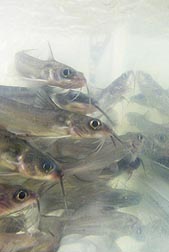Read the magazine story to find out more.
|
|
Fish Reared in Hard Water are More Susceptible to Columnaris Disease
By Sandra Avant
June 23, 2015
Water hardness can influence the development of columnaris disease in catfish, according to a study by U.S. Department of Agriculture (USDA) scientists.
Agricultural Research Service (ARS) scientists found a difference in disease development in fish exposed to hard and soft water containing the bacterial pathogen Flavobacterium columnare, which causes columnaris disease.
David Straus, a toxicologist at the ARS Harry K. Dupree Stuttgart National Aquaculture Research Center (SNARC) in Stuttgart, Arkansas, and his colleagues worked with scientists at ARS’s Warmwater Aquaculture Research Unit (WARU) in Stoneville, Mississippi. Water from both locations comes from the same aquifer but is very different. Well water at SNARC contains significant amounts of calcium and magnesium, common minerals that make water hard. The water at WARU contains very little dissolved calcium and magnesium but contains more dissolved organic matter.
In one experiment, scientists compared the effects of water hardness on catfish challenged with the same concentration of the disease-causing pathogen in SNARC’s water and WARU’s water. They found that all fish in the SNARC (hard) water died, while none of the fish in the WARU (soft) water died.
DNA tests showed that fish in SNARC water had about 1900 times more bacteria attached to their gills than fish in WARU water—a substantial difference.
Scientists conducted a second experiment to determine which factor—hardness or dissolved organic matter—caused the difference in fish mortality. They eliminated most of the calcium and magnesium by filtering the SNARC water with a commercial water softener, which caused a decrease in bacterial adhesion to gills. When the water was filtered, all of the fish lived, even though the water contained the same amount of the pathogen that causes columnaris. Removal of dissolved organic material in WARU water with a carbon filter didn’t affect bacterial adhesion.
Read more about this work in the June 2015 issue of AgResearch magazine.
ARS is USDA’s principal intramural scientific research agency, and this research supports the USDA priority of promoting international food security.
